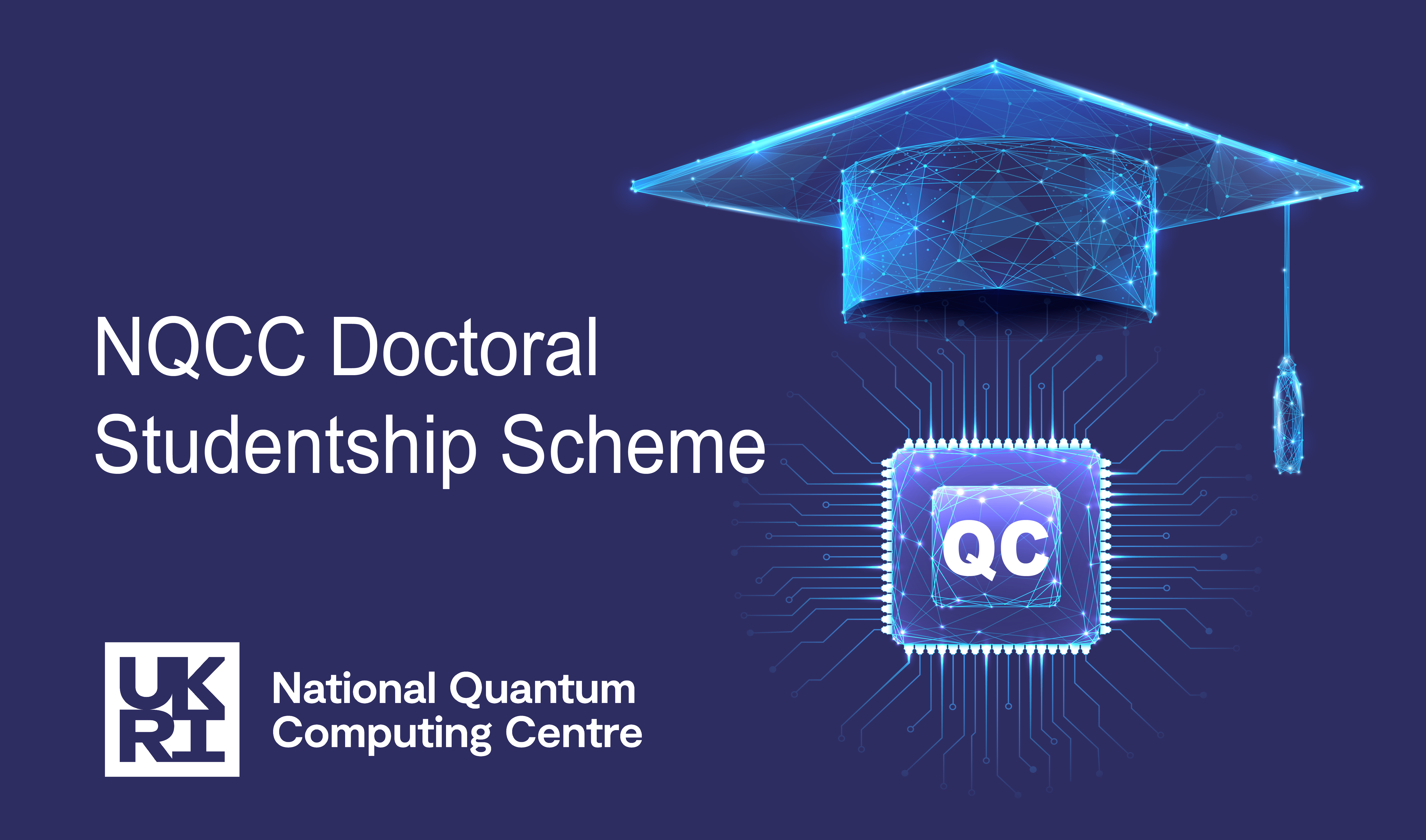NQCC doctoral studentship scheme: Project proposal EOI
Overview
The National Quantum Computing Centre has 6 funded studentships available to UK universities to run from autumn 2026. These studentships will form the second cohort of the NQCC’s Doctoral Studentship Scheme. The funding will be provided through EPSRC Industrial Doctoral Landscape Awards (IDLA), with the NQCC as the industrial partner.
The application process has two stages. Firstly, the NQCC is inviting short summaries of proposed projects via an Expressions of Interest (EOI) call. Shortlisted EOI summaries will then be developed into full proposals with an NQCC co-supervisor. In August, the outcome of the EOI stage will be shared with all applicants, and more information on the full proposal stage of the process will be shared with the shortlisted EOI applicants.
A description of this studentship scheme, along with instructions on how to submit an expression of interest (EOI), is available below. The deadline for EOIs is 13th July 2025.
Important dates
|
|
Date |
|
EOI for studentships |
Opens 9th June 2025 Closes 13th July 2025 |
|
EOI shortlisting |
Late July 2025 |
|
Full project proposals |
Invitations by early August 2025 Closes 28th September 2025 |
|
Review board shortlisting |
By late October 2025 |
|
EPSRC review |
Late October 2025 |
|
Announcement of results |
Early November 2025 |
NQCC studentships
The NQCC’s vision is for the UK to harness the power of quantum computing to solve some of the most complex and challenging problems facing society today. To help achieve this vision, the NQCC’s technology programme addresses key challenges associated with scaling quantum computing. To support the delivery of the National Quantum Strategy, particularly its objective to ‘ensure the UK is home to world-leading quantum science and engineering, growing UK knowledge and skills’, the NQCC’s doctoral studentship scheme aims to:
-
Fund applied research that bridges the gap between academia and industry, helping to de-risk the technology
-
Drive the generation of deeply skilled academic graduates who are highly employable across the UK quantum computing value chain
The NQCC funds studentships across quantum computing hardware, software, applications and component technologies. Studentships will sit within one of the following technical teams: trapped ions, superconducting circuits, tweezer arrays, software and control systems and quantum applications. NQCC priority themes within both quantum software and hardware research are outlined below. Topics of particular interest are highlighted within these themes. However, we welcome applications on any topics associated with these themes.
Priority research themes
Quantum Software:
(i) Development and/or improvement of quantum algorithms
-
Addressing bottlenecks in variational quantum algorithms for optimisation/machine learning
(ii) Benchmarking
-
Benchmarking hybrid quantum-classical algorithms for optimisation.
(iii) Scalable error correction and noise mitigation protocols
-
Error-correcting compilers and algorithms
-
Decoders and control system interfaces for real-time error correction.
-
Techniques for practical quantum fault tolerance and the resources necessary to implement them
(iv) Emulation, noise modelling and resource estimation
-
Resource estimation for megaquop to teraquop quantum computing systems
-
Characterising performance through open-source noise simulation and device emulation or Quantum Computing as a Service (QCaaS)
Quantum Hardware:
(i) Future directions in qubit architecture
-
Proposals or demonstrations of novel qubit architectures
-
Advances in qubit addressing or qubit-qubit connectivity
(ii) Demonstrations of error correction and mitigation
-
Experimental demonstrations of logical qubits
-
Hardware-level noise protection or detection
(iii) Distributed quantum computing systems
-
Proposals and modelling of distributed quantum computing architectures
-
Building blocks of distributed QC systems e.g. QPU modules, interconnects, transducers, memories and repeaters, control architecture.
(iv) Device and component fabrication for improved stability and yield at scale
-
Improved nano- and micro-fabrication of quantum devices or related components
-
Integrated photonic circuits/components and silicon electronics to support quantum computing hardware
(v) Scalable and synchronous control architectures
-
HPC integration: QPU-GPU-CPU interfaces and scalable I/O throughput for real-time analysis and feedback (e.g. for error correction, error mitigation, conditional control, atom rearrangement)
-
Distributed FPGA control nodes ( e.g. adding WhiteRabbit to EPICS)
-
Scalable electronics and components for cryogenic control, readout and signal conditioning
How to apply/ process:
Applicants should complete the EOI response form by 13th July 2025. EOI project summaries will be shortlisted, and applicants informed of the outcome in early August. Shortlisted EOI summaries will then be invited to develop full proposals with an NQCC co-supervisor. More information on this stage of the process will be shared with shortlisted applicants in early August.
Guidance
-
EOI proposals should focus on research and innovation ideas aligned to the priority research themes outlined under ‘NQCC studentships’
-
EOI proposals should focus on research with a route to scaling or application as opposed to fundamental research into quantum computing, in line with the NQCC’s remit.
Audiences
- Anyone from any background
Interests
- Post Graduate Research (PGR)


Share
Share on Twitter Share on Facebook